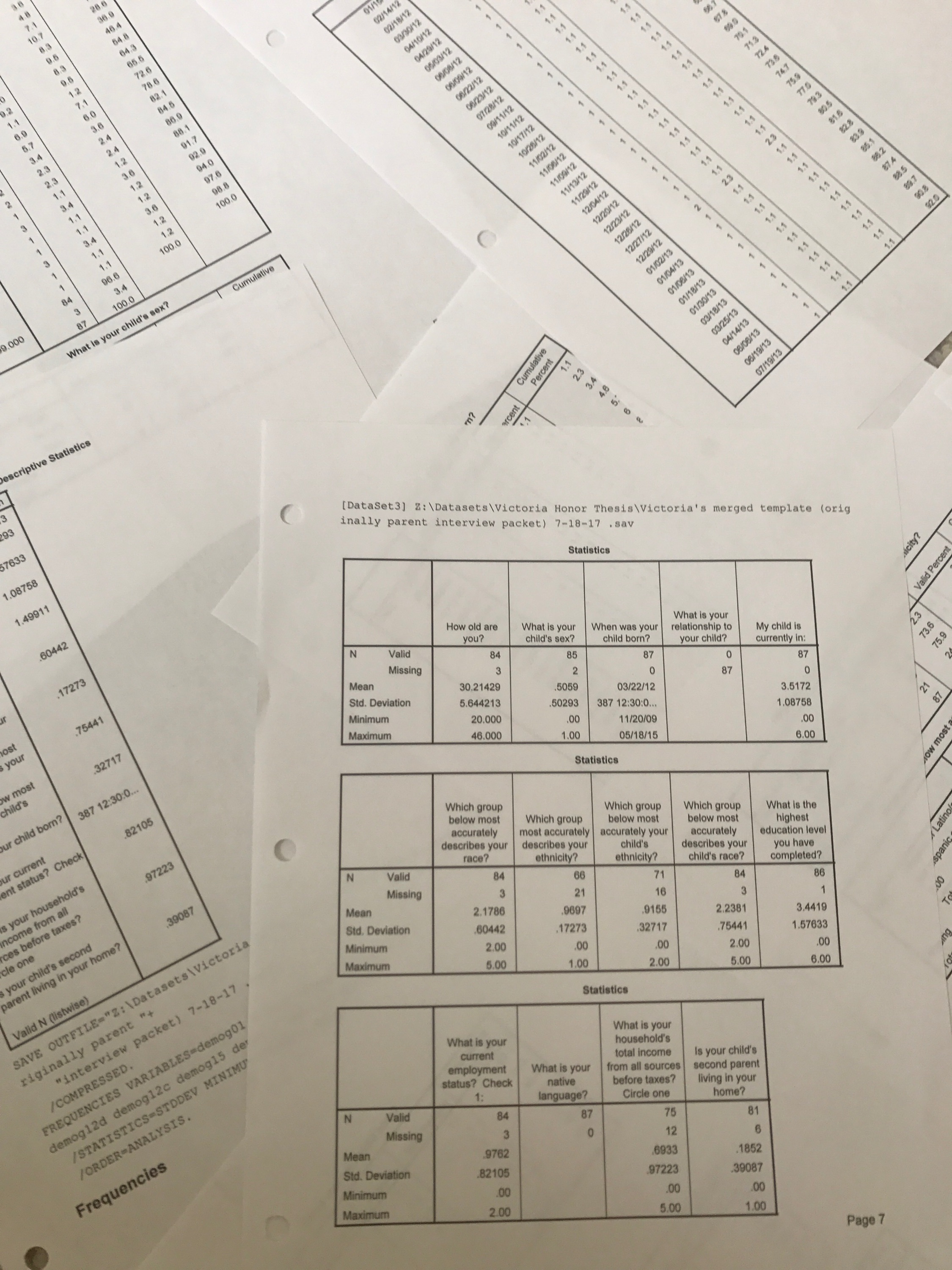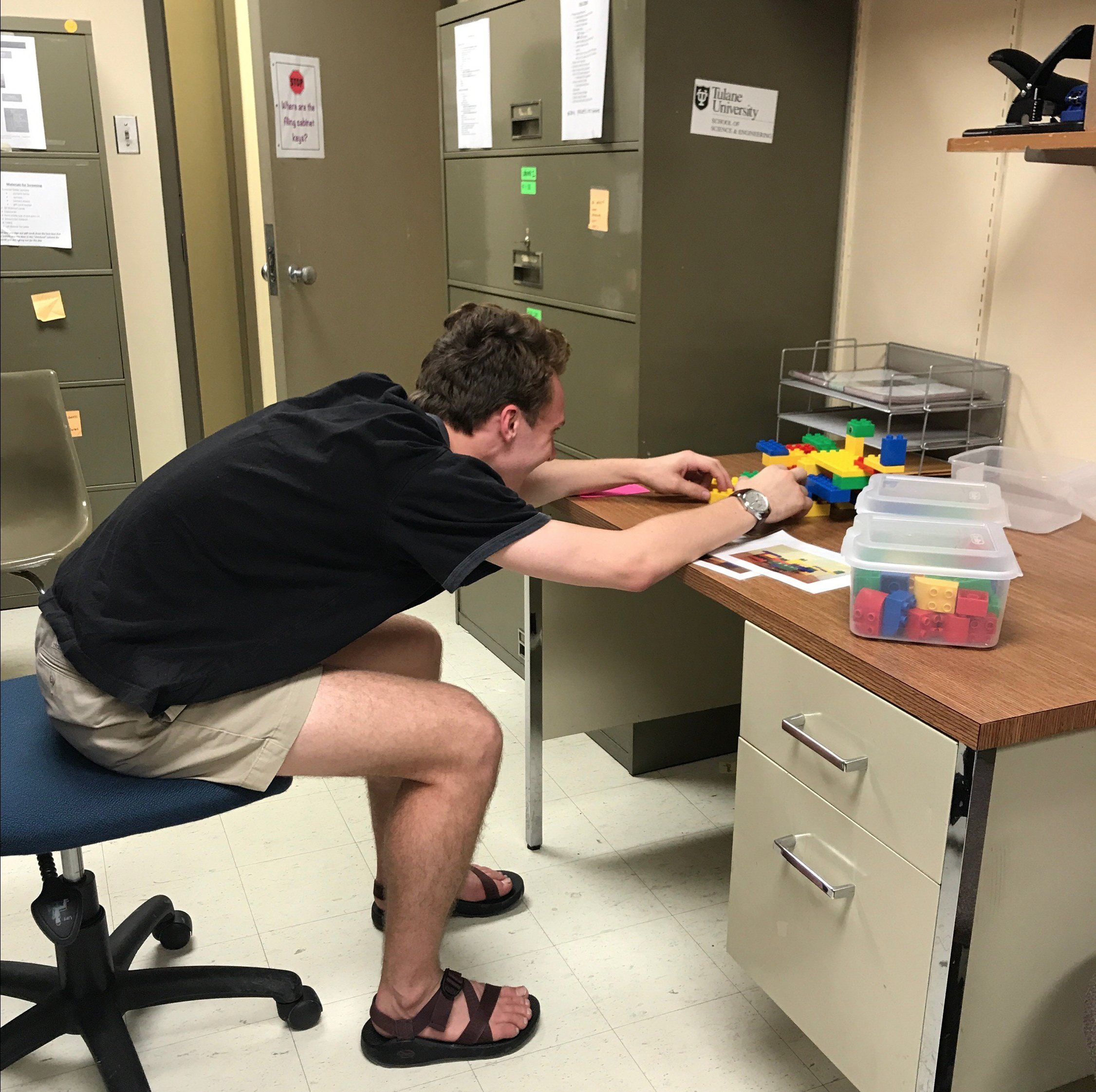Summer in the Child and Family lab has been zooming by, and much has been happening! We have welcomed wonderful incoming graduate students to our team while saying sad but proud goodbye to others, we have started a shift in focus from purely data collection to exploratory analyses and critical thinking of our aims, and we have graduate students attending and presenting innovative posters regarding significant lab data findings at the APA’s (American Psychology Association) annual convention!
As for me, I have been constantly learning new things, gaining more confidence and insight around the field of psychology and how I want to be a part of it in the future, and working towards my learning objectives that I established at the start of the summer. These objectives were:
- I hope to broaden my understanding of the statistical analyses with applied, experimental psychology and SPSS software, and then use that knowledge to help think critically of how best to run and analyze our data.
- I hope to strengthen my participant recruitment skills and the administrative side of clinical psychology research, without which the lab would not be able to continue.
- I hope to develop and improve my scientific writing skills by both reading more of the current literature, papers and posters of the graduate students, and writing myself.
- I hope to further my PSRA coding reliability and complete a systematic review of how past studies have used such data to shape the future direction of our analyses.
- And finally, I hope to work closely with the graduate doctoral student’s, so that I can learn from them, and confirm that this is the future work I want to pursue.

In terms of participant recruitment, I have a distinct memory at the beginning of last year of hearing Margaret, our prior undergraduate in charge of recruitment, making phone calls to participants in lab and thinking that I could never do that. I was scared of being too awkward, pushy, intrusive, unprofessional or hung up on. So, when I was told I was going to take over for Margaret since she graduated, I was nervous to say the least! However, as I trained in our recruitment protocol, I began to feel more competent, and then with each call I made all those fears and insecurities began to disappear. Recruitment is a crucial part of keeping the lab moving forward, and although more administrative, it is a valuable skill both within and beyond the field of psychology. Furthermore, once a week I go to a pediatric clinic to do in-person recruitment. Connecting with the participants, being able to explain the study to them and answer their questions is actually a very rewarding process because it allows me to value them as people who are willing to give their time and energy to join the lab team in order to help important research take place, rather than to just view these people as identification numbers in my data entry tasks.Although I definitely have a lot to learn in the realm of SPSS, I have transitioned from knowing only how to enter data to understanding how to create basic syntax, merge data sets, check for specific errors and interpret demographic descriptive and frequency statistical analyses. My SPSS knowledge has grown through youtube tutorials, books and resources from our lab library, and hands-on guidance and instructions from graduate students. My proudest accomplishment thus far in terms of SPSS was creating a syntax for a community violence exposure variable as well as using SPSS to attain the demographic information and statistics regarding the participants I am using for my independent research project.
The development of my scientific writing has been one of the areas I have improved the most on. Before this summer, I really did not know much about scientific writing because most of my psychology classes have been lecture and exam-based. With the guidance of 4th year graduate student, Justin Carreras, in my endeavor to write a literature review regarding the constructs of self-regulation, emotion recognition, social competency and school readiness in the context of a child’s community violence exposure, I have gained much knowledge about conducting independent research, reading empirical articles and writing them. For those of you embarking on your own research and literature reviews who want some guidance, I highly reccomend Writing Literature Reviews by Jose L. Galvan as a resource!
The PSRA (Preschool Self-Regulation Assessment) Data coding has been progressing forward slowly but surely! Depending on how busy the week in lab is, I code around four to eight videos each week

-
Peter, one of our undergraduate RA’s attempting one of our child visit 2 tasks to make sure we have all the right legos pieces
starting from our oldest data working to the new, while our Lab Head, Hannah does her own coding, working from new to old. Eventually we will meet in the middle and then go through and consensus code the other’s work. Hannah and I have both completed many videos in order to train for correct and aligned coding and we conference every other week to go over any issues that arose.
Finally, I have indeed been working closely and learning lots from the graduate students! From SPSS training to article presentations and discussions during our weekly lab meetings the graduate students always interact with the undergrads and help us grow us learners and critical thinkers. Elsa Obus, a second year graduate student, is heading to the annual APA convention on August 3rd to present her research on Associations Between Preschool Children’s Exposure to Arrest and Incarcerated Problem Behaviors . We are all so excited for her!
This summer experience in lab has really helped me develop as a female leader as I have had so many incredible mentors that through modeling and support have allowed me to gain confidence in my ability as a competent woman working within the field of psychology. From tangental conversations in lab that, as women, we need to stop constantly apologizing to each other in the work place to seeing our Principal Investigator, Dr. Sarah Gray, successfully run a lab, enter motherhood, while at the same time dedicate herself to her many other work responsibilities (Supervision of the Tulane Psychology clinic, mentoring graduate and undergraduate students and much more!) Overall, I am so excited that this summer in the Tulane Child and Family Lab has allowed me to build my skill sets as a critical thinker and future psychologists and prepared me as I embark on my senior year and beyond!
